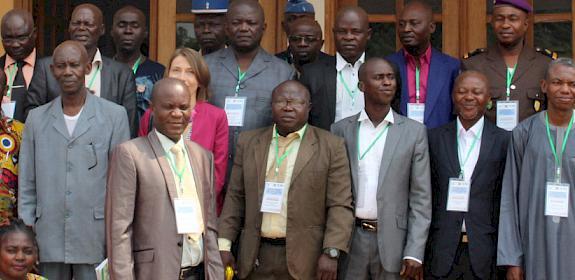International rhino task force to combat illegal poaching and trade
Cambridge, UK, 20th August 2008—The Convention on International Trade in Endangered Species of Wild Fauna and Flora (CITES) is establishing a Rhinoceros Enforcement Task Force to counter rising levels of rhino poaching and illicit horn trade in Asia and Africa.

The move follows a report from the CITES Secretariat expressing concerns over reports of increasing poaching and illegal trade in rhinoceros horn, and the highly-organized nature of these activities. The report noted that considerable profits appear to be involved in rhino poaching, with strong grounds to suspect the involvement of money-laundering.
TRAFFIC and WWF welcomed the initiative: “Countries in Asia and Africa are up against an insidious, organized illegal rhino horn trade, which can only be stopped through the formation of the rhino task force,” said Dr Susan Lieberman, Head of WWF International’s Species Programme.
Despite some noteworthy enforcement successes in southern Africa and South Asia, the plight of rhinos in Asia and Africa is growing ever more alarming. In Zimbabwe, currently around 70% of all detected rhino deaths are of animals killed illegally, a particularly worrying statistic given there are effectively no new, safe areas to move animals to.
In Asia, poachers have targeted rhinos in Indian national parks, with more than 35 rhinos killed in and around Kaziranga National Park in Assam since 2007, and rhino populations in Orang also being poached. The sudden upsurge in rhino killings is a major challenge for regional enforcement agencies, and the Army has been called in for support. WWF and TRAFFIC are also co-ordinating emergency support. Between 2000 and 2006, over 130 rhinos were killed in various parts of Nepal. With civil unrest affecting large parts of the country, poachers apparently took advantage of the situation. The country has now taken up strict measures to combat poaching and illegal trade and has stressed the importance of involving local communities in anti-poaching activities.
A TRAFFIC report released at the 14th Meeting of the Conference of the Parties to CITES last year had warned of increases in the volume of rhino horn entering illegal trade from Africa since 2000, with poaching most severe in Zimbabwe and the Democratic Republic of Congo (DRC). More than 60% of the rhino population in DRC was illegally killed between 2003 and 2005. In Zimbabwe, poaching accounted for two-thirds of all rhino mortalities over the same period, affecting one in eight animals.
Earlier this year, TRAFFIC facilitated a hands-on workshop between law enforcement personnel from South Africa and Zimbabwe to discuss specific outstanding law enforcement cases involving illegal cross-border trade in rhino horn with the objective of moving key investigations forward towards legal actions against alleged suspects. TRAFFIC has also worked with enforcement officials of India, Nepal and Bhutan to strengthen trans-border co-operation on wildlife crime issues.
“Better cross-border co-operation and information sharing between enforcement agencies is key to tackling the highly organized poaching operations operating in Africa and Asia,” said Simon Milledge, TRAFFIC’s Rhino Co-ordinator.
Most rhino poaching is to supply horns for use in traditional Asian medicines, although there is growing evidence the demand for horns (for use as traditional dagger handles) is re-emerging in the Middle East. A new trend in South Africa is for illicitly acquired horns from the private sector to be claimed as legitimate sport hunting trophies and exported. Vietnamese citizens have been implicated, and Viet Nam is emerging as a key player in the illegal horn trade.
The formation of the Rhinoceros Task Force was endorsed by the CITES Standing Committee in July, and the first meeting will take place in Kenya in November 2008. Like other CITES Enforcement Task Forces, it will be co-ordinated by the CITES Secretariat.




